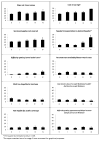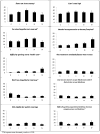Disability Stages and Trouble Getting Needed Health Care Among Medicare Beneficiaries
- PMID: 27754997
- PMCID: PMC5391295
- DOI: 10.1097/PHM.0000000000000638
Disability Stages and Trouble Getting Needed Health Care Among Medicare Beneficiaries
Abstract
Objective: The aim of this study was to examine whether activity limitation stages were associated with patient-reported trouble getting needed health care among Medicare beneficiaries.
Design: This was a population-based study (n = 35,912) of Medicare beneficiaries who participated in the Medicare Current Beneficiary Survey for years 2001-2010. Beneficiaries were classified into an activity limitation stage from 0 (no limitation) to IV (complete) derived from self-reported or proxy-reported difficulty performing activities of daily living and instrumental activities of daily living. Beneficiaries reported whether they had trouble getting health care in the subsequent year. A multivariable logistic regression model examined the association between activity limitation stages and trouble getting needed care.
Results: Compared with beneficiaries with no limitations (activities of daily living stage 0), the adjusted odds ratios (ORs) (95% confidence intervals [CIs]) for stage I (mild) to stage IV (complete) for trouble getting needed health care ranged from OR = 1.53 (95% CI, 1.32-1.76) to OR = 2.86 (95% CI, 1.97-4.14). High costs (31.7%), not having enough money (31.2%), and supplies/services not covered (24.2%) were the most common reasons for reporting trouble getting needed health care.
Conclusion: Medicare beneficiaries at higher stages of activity limitations reported trouble getting needed health care, which was commonly attributed to financial barriers.
Figures
Similar articles
-
Patient Satisfaction and Perceived Quality of Care Among Younger Medicare Beneficiaries According to Activity Limitation Stages.Arch Phys Med Rehabil. 2019 Feb;100(2):289-299. doi: 10.1016/j.apmr.2018.09.114. Epub 2018 Oct 12. Arch Phys Med Rehabil. 2019. PMID: 30316959
-
Disability stage and receipt of recommended care among elderly medicare beneficiaries.Disabil Health J. 2017 Jan;10(1):48-57. doi: 10.1016/j.dhjo.2016.09.007. Epub 2016 Oct 4. Disabil Health J. 2017. PMID: 27765676 Free PMC article.
-
Activity Limitation Stages empirically derived for Activities of Daily Living (ADL) and Instrumental ADL in the U.S. Adult community-dwelling Medicare population.PM R. 2014 Nov;6(11):976-87; quiz 987. doi: 10.1016/j.pmrj.2014.05.001. Epub 2014 May 2. PM R. 2014. PMID: 24798263 Free PMC article.
-
Patient Satisfaction and Perceived Quality of Care Among Older Adults According to Activity Limitation Stages.Arch Phys Med Rehabil. 2015 Oct;96(10):1810-9. doi: 10.1016/j.apmr.2015.06.005. Epub 2015 Jun 26. Arch Phys Med Rehabil. 2015. PMID: 26119464 Free PMC article.
-
Treatment disparities for disabled medicare beneficiaries with stage I non-small cell lung cancer.Arch Phys Med Rehabil. 2008 Apr;89(4):595-601. doi: 10.1016/j.apmr.2007.09.042. Arch Phys Med Rehabil. 2008. PMID: 18373987 Review.
Cited by
-
Near Vision but not Hearing Loss is Associated with Lacking a Usual Source of Health Care.J Aging Health. 2021 Oct;33(9):786-797. doi: 10.1177/08982643211014323. Epub 2021 Apr 29. J Aging Health. 2021. PMID: 33914652 Free PMC article.
-
Characteristics of community-dwelling older individuals who delayed care during the COVID-19 pandemic.Arch Gerontol Geriatr. 2022 Jul-Aug;101:104710. doi: 10.1016/j.archger.2022.104710. Epub 2022 Apr 27. Arch Gerontol Geriatr. 2022. PMID: 35500472 Free PMC article.
References
-
- Goldberg TH, Chavin SI. Preventive medicine and screening in older adults. J Am Geriatr Soc. 1997;45:344–354. - PubMed
-
- Centers for Disease C, Prevention. Pneumococcal and influenza vaccination levels among adults aged > or = 65 years--United States, 1995. MMWR Morb Mortal Wkly Rep. 1997;46:913–919. - PubMed
-
- Drum C, McClain M, Horner-Johnson W, et al. Health Disparities Chart Book on Disability and Racial and Ethnic Status in the United States. Durham, NH: 2011.
-
- Beatty PW, Hagglund KJ, Neri MT, et al. Access to health care services among people with chronic or disabling conditions: patterns and predictors. Archives of physical medicine and rehabilitation. 2003;84:1417–1425. - PubMed
MeSH terms
Grants and funding
LinkOut - more resources
Full Text Sources
Other Literature Sources
Medical



